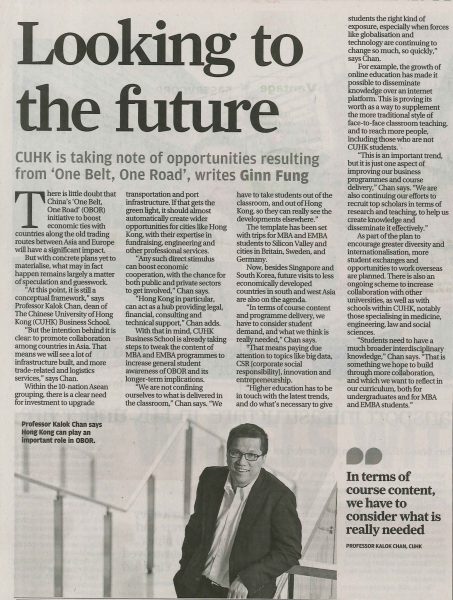Hong Kong’s Expertise Can be Put to Use in ‘One Belt, One Road’

There is little doubt that China’s “One Belt, One Road” initiative to boost the economic ties with countries along the old Silk Road will have a significant impact on the regional economy in the years ahead. In an interview with South China Morning Post, Prof. Kalok Chan says that higher education has to be in touch with the latest trends and developments, and do what’s necessary to give students the right kind of exposure.
There is little doubt that China’s “One Belt, One Road” (OBOR) initiative to the boost economic ties with countries along the old trading routes between Asia and Europe will have a significant impact on the regional economy in the years ahead.
Commenting on the OBOR initiative, Kalok Chan, Dean of The Chinese University of Hong Kong (CUHK) Business School and Wei Lun Professor of Finance, says in an interview with South China Morning Post that “at this point, it is still a conceptual framework. But the intention behind it is clear: to promote collaboration among countries in Asia. That means we will see a lot of infrastructure built, more trade-related and logistics services, and there will also be the funding side to think of, in order to support these other developments.”
Just within the 10-nation ASEAN (Association of Southeast Asian Nations) grouping, there is a clear need for investments to upgrade the transportation and port infrastructure within the region. And if infrastructure upgrade gets the green light, it would almost automatically create a wide range of opportunities for cities like Hong Kong, whose expertise in fundraising, engineering and other professional services would be in great demand.
“Any such direct stimulus can boost economic co-operation, with a chance for both public and private sectors to get involved,” Dean Chan says. “Hong Kong, in particular, can act as a hub providing legal, financial, consulting and technical support for projects in Asia and beyond.”
With that in mind, CUHK Business School is already taking steps to tweak the content of its MBA and EMBA programs to increase general student awareness of OBOR and its longer-term implications.
“We are not only confining ourselves to what is being delivered in the classroom,” Dean Chan says. “A lot of the times, we have to take students out of the classroom and Hong Kong, so they can really see the developments elsewhere.”
“In terms of course content and programme delivery, we have to consider students’ demand and what we think is really needed. That means paying due attention to topics like big data, CSR [corporate social responsibility], innovation and entrepreneurship. Higher education has to be in touch with the latest trends, and do what’s necessary to give students the right kind of exposure, especially when forces like globalisation and technology are continuing to change so much, so quickly,” Dean Chan adds.
The growth of online education has made it possible to disseminate knowledge over the Internet. This is proving its worth as a way to supplement the more traditional style of face-to-face classroom instruction, and to reach out to more people, who aren’t necessarily CUHK Business School students.
“This is an important trend, but it is just one aspect of improving our business programmes and course delivery. We are also continuing our efforts to recruit top scholars in terms of research and teaching, to help us create knowledge and disseminate it effectively,” Dean Chan states… Read More (PDF)
Please also click on the images below to read the article published in South China Morning Post‘s print edition.
Source: South China Morning Post
Date published: 30 March, 2016 / 5 April, 2016 (print edition)


